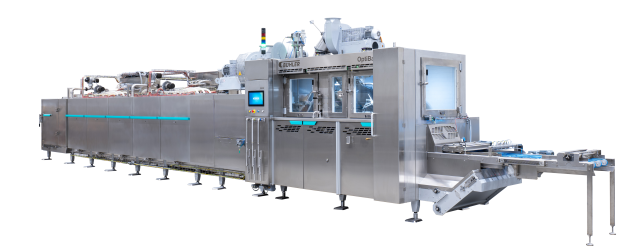Bühler Group has launched an inductively heated wafer oven, OptiBake, which it describes as a world first in industrial baking. The solution is tailored for flat and hollow wafers, and offers greater energy efficiency and new possibilities for precise control.

Source: Bühler Group
OptiBake’s induction heating system uses electromagnetic fields to generate heat directly within the baking plates, dispensing with open flames and combustion. The result is a process that produces no direct emissions of carbon dioxide (CO2), carbon monoxide (CO), or nitrogen oxides (NOx).
These emission reductions reduce energy consumption by 50 per cent compared to conventional gas-fired wafer baking ovens, and can lead to tax and licensing advantages, along with increased subsidy opportunities.
Bühler Group wafer business unit head, Sandra Lutz, said with OptiBake, the company challenged itself to combine exceptional wafer quality with unprecedented flexibility, while enabling customers to contribute to sustainability.
“Our electric induction heating technology responds to the global demand for higher quality and efficiency, reduced operational costs, and a significantly lower carbon footprint.”
At the heart of the oven’s performance is a newly engineered baking plate design, developed to produce the highest wafer sheet quality in combination with the inductive heating system.

Source: Bühler Group
Paired with a system for individual plate temperature control, it ensures precise and consistent heat distribution throughout the baking process. The ability to fine-tune temperatures plate by plate not only improves product quality but also allows for flexibility and responsiveness.
The low baking chamber temperatures reduce life-cycle costs by minimising thermal stress on components such as cables and bearings. OptiBake also creates a quieter production environment by eliminating burner nozzle flow noise and simplifies heat recuperation due to the absence of combustion products.
Furthermore, the new oven allows for 100 per cent raw material utilisation, as baking scraps do not burn and can be repurposed. The system is also designed to operate without posing any electromagnetic compatibility (EMV) risks, ensuring safe and interference-free integration into industrial environments.
Bühler is a global group with an office in Melbourne, which supplies the Oceania region with solutions for grain handling, milling, malting, brewing, nuts and seeds processing, chocolate production, meat alternatives, pet food, and animal feed production.






